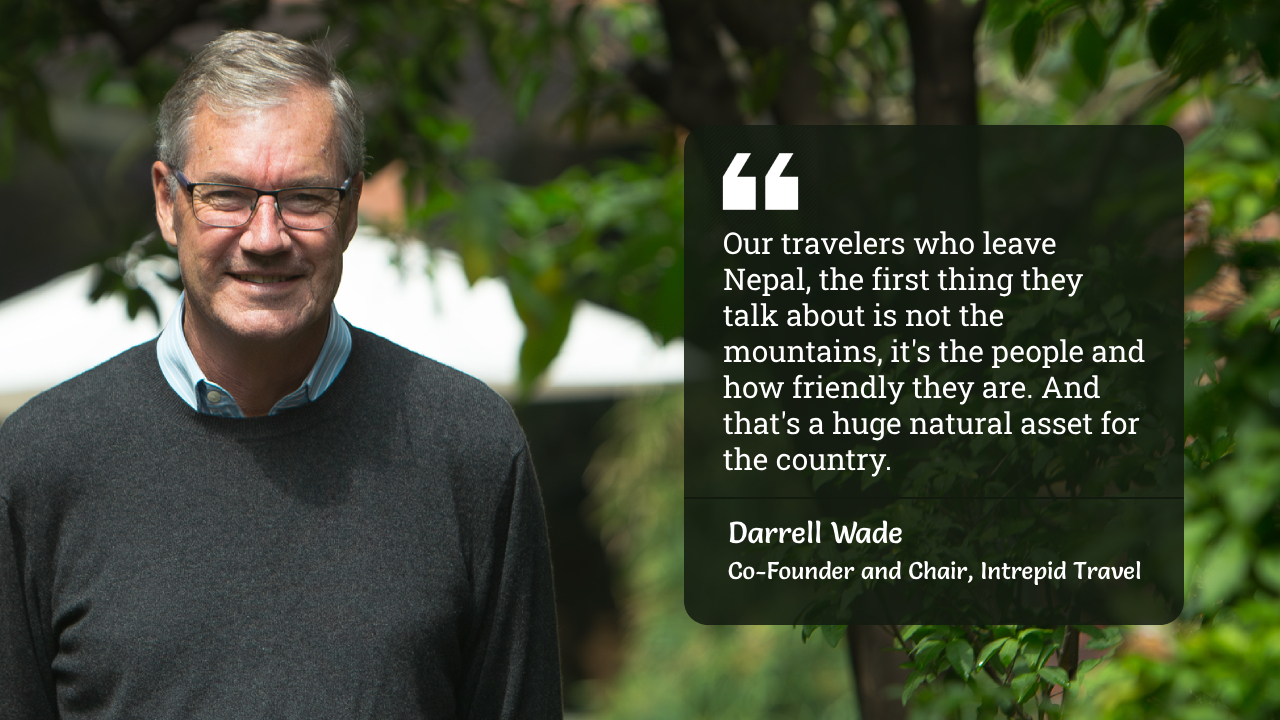
Intrepid Travel has been leading the global front in sustainable tourism with it's mission to create positive change through the joy of travel, community and connection. Darrell Wade has been spearheading Intrepid for more than 30 years along with his co-founder Geoff Manchester. Their vision of perceiving and promoting travel as a force of good has earned Intrepid a certification of B-Corp; Intrepid truly lives up to the goal of being best travel company not just in the world, but for the world.
We have had the opportunity to talk with Mr. Wade, co-founder and chairperson of world's leading travel company Intrepid, during his 3 day visit to Nepal. Mr. Wade shared his experience of travelling in Nepal, sending tourists to Nepal, and how the country can prosper even more in tourism sector.
Hello Mr. Wade, first of all, welcome to Nepal.
Great, thank you.
So, how has been your experience in Nepal so far?
It's great. I've only been here a couple of days, so it's a short visit, but I always love coming to Nepal. The people are so great, you always feel so welcome, and it's just a wonderful country.
And I believe you have been to Nepal so many times before, how has your experience changed over the years?
It has indeed changed. I first came to Nepal in 1984, so you know, 40 years ago, so as you can imagine, the change has been incredible in that time. You know, the streets are all different, the buildings are all different, everything, you know, in those days, the town was full of cycle rickshaws, now it's full of cars.
And it's kind of even crazier than it was back then, it's so busy now.
What are your favorite five places to visit in Nepal? It might be a bit personal question as well.
Yeah, five. I've certainly been to a lot more than five places over the years, but the Khumbu-Everest region is obviously fantastic. My family and I walked in the Annapurna regions a few years back and that was equally brilliant.
Going rafting on some of the rivers is something that these days not that many people are doing, but it's a sensational thing to do. Chitwan National Park, some of the smaller towns like Bandipur is really good. Nepal is just one of those countries with so much to offer travelers.
It's really quite extraordinary.
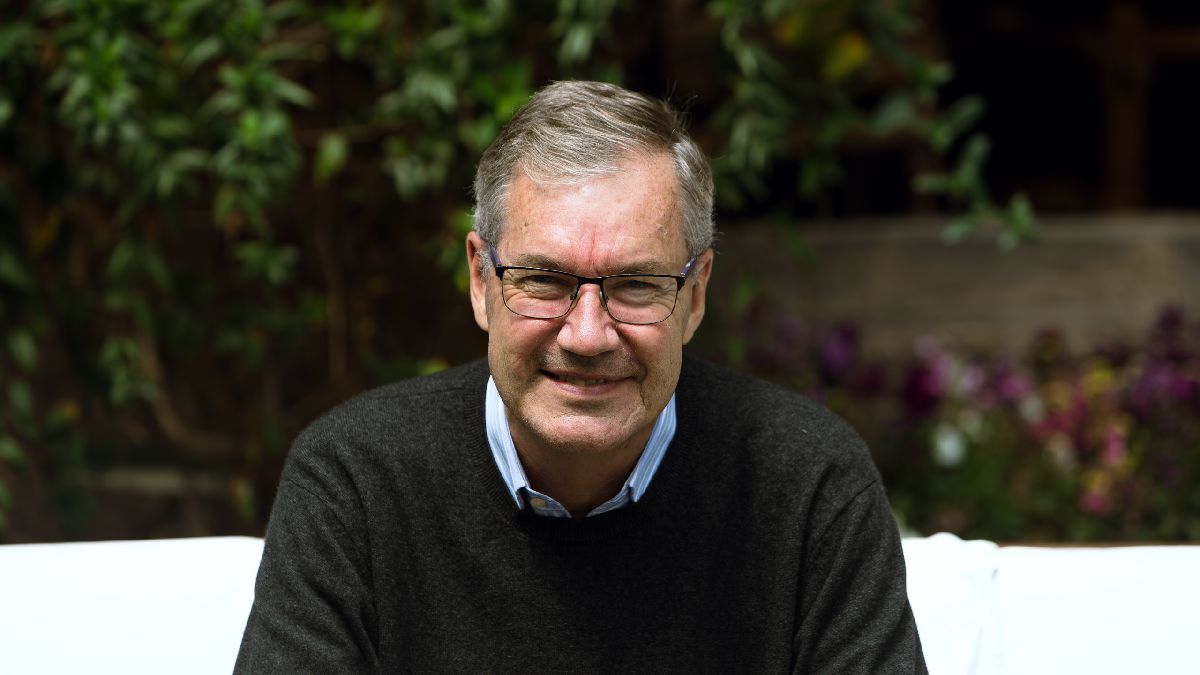
You've been in this field for so long, what would be your suggestion to promote sustainable tourism in Nepal? Because the travel that can be sustainable and unsustainable, that can be a good for the environment and bad for the environment, good for the indigenous people and sometimes bad for them. What would be your suggestions to Nepal so that we can promote tourism sustainably?
First of all, I think you need a whole of industry approach. Whilst tour operators and individual players can do certain things and should do certain things, you nonetheless need a structured approach. One thing that's useful to look like is the Global Sustainable Tourism Council has approaches for all of country approach on sustainability.
That looks at the hotel industry, looks at destination issues, it looks at what government can do and it looks at the whole field of how you build sustainability into the destination. I should say, sustainability is critical. It's not just a nice to have, but increasingly travelers around the world are looking to destinations that are more sustainable.
You hear about over-tourism in the world and certain areas and certain destinations are starting to lose the appeal of what they originally had because too many tourists are going to small areas. Nepal's got to be very careful that it's not a victim of its own success. It needs to build in sustainability so that hotels are not using single-use plastics, for renewable energy sources where we can, using electric vehicles where we can, and really doing it the whole gamut of facilities to improve sustainability.
The thing about improving sustainability is it gives the traveler a better experience so they're more likely to rate Nepal highly. But of course the main reason to do it is that it benefits local communities. It means there's less rubbish in the streets, there's less pollution in the air, the quality of water is better.
That's for everyone, not just for tourists. And so by building a sustainable economy, you're benefiting the whole of society.
And what do you think the government of Nepal, what kind of policy and reforms should the government of Nepal implement, so that it will be more feasible to invite more tourists to Nepal and promote the nature and culture of Nepal?
I'm not one to speak for government, I mean, the government needs to decide what suits the national priorities of Nepal, and so the government is best to do that. But I will say that the tourism industry has the capability to deliver a lot of wealth into the country, and that money that flows into the country because of tourism can really benefit people if it's well designed. So you know, I'm a very big advocate of looking at the infrastructure needed to support tourism, so that tourism can come in, and the money tourists spend and the taxation revenue raised through tourism can benefit all of the people of Nepal.
What do you think has been missed until now, we have got some amazing places in Nepal, we can promote them, we can even promote other unexplored places in Nepal? What something new can be done to promote such places, or what could we do something newly?
The potential for tourism in Nepal is really quite amazing, and it's a lot more than what we're seeing at the moment. I think one of the things in order to fulfil that potential is really look at the infrastructure that's required for tourism. It's really quite basic stuff like roads and water and power supply.
Those things benefit the local community, but they also benefit tourism enormously. I think in terms of the design of product, Nepal suffers a little bit because of the very attraction that people come for. So Mount Everest is of course the icon of Nepal, one of the icons of the world, and so people come here and they want to do the Everest base camp trip.
That's fine and that's good, but actually the diversity of Nepal is so much more than that. And so I think, we as an industry, plus the government, plus other tour operators, need to really talk about that diversity, build the attractions so that people don't just go to Everest base camp, but they go to all the other areas in Nepal, which again, benefit the country, benefit local communities, and spread the benefit of tourism.
What would the foreigners look forward to when they come to Nepal? What would be their primary thoughts while coming to Nepal?
Well, I think when people have never been to Nepal, their first thoughts are always about the mountains. It's about the Himalaya. You know, that is the icon of Nepal.
It is what people are coming here to see. But of course, as an industry, we like to promote, and I'm sure the government also likes to promote, that there is so much more to Nepal than just the mountains. And I think the second biggest attraction for Nepal is actually the people.
You know, the people are remarkably friendly. We know our travelers who leave Nepal, the first thing they talk about is not the mountains, it's the people and how friendly they are. And that's a huge natural asset for the country.
You are a traveler yourself, and you're a travel entrepreneur. What would be your personal plan? What is your personal plan, if I may ask, about exploring Nepal?Something you are looking forward to so that it can be portrayed as something you love doing for the rest of the world?
I think the next time I come back to Nepal, and there definitely will be a next time, and it won't be far away, I want to travel slower. You know, I think sometimes as a traveler, you get caught up in the hurly-burly of travel. But actually, the best part of travel is travelling slowly and really taking in the destination.
It's having that extra conversation with someone. It's sitting in a beautiful square like this and having a cup of coffee and just absorbing the atmosphere. I think too often we go from this place to the next place to the next place to the next place, and we don't take time to absorb the destination.
And that's really important, because when you think about it, why is it that we travel as humans? We travel to go somewhere new, to learn something, to absorb something of the culture, to meet people.
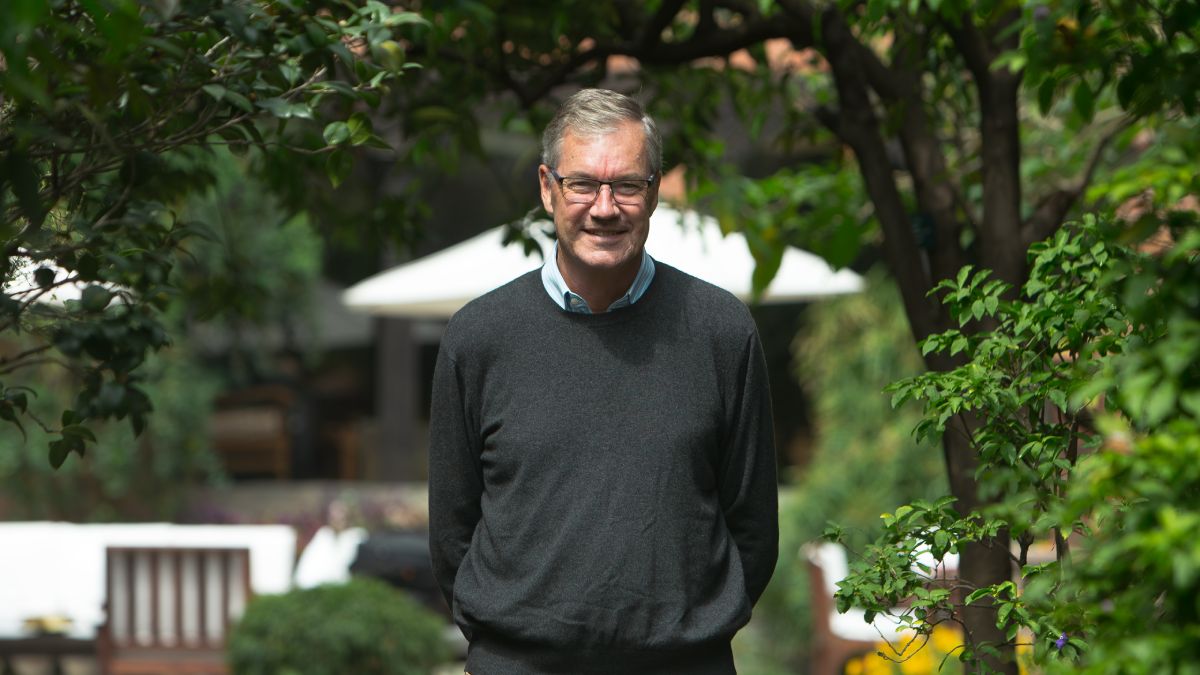
There are a lot of unexplored places in Nepal. For example, Mount Everest is not the only mountain in Nepal we have more mountains than one person can possibly climb in their lifetime. We even have other beautiful places rather than just mountains as well.There are other unexplored indigenous tribes in Nepal that we can delve into their lives later and then make some kind of promotional material from it. Maybe we can introduce Nepal as a hub for natural and cultural tourism as well.
What would be your suggestion for Nepali people and other travel entrepreneurs in Nepal and government itself, so that we can promote unexplored places?
I think the future of Nepal tourism really relies on the development of new areas. There's no question that Nepal has a lot of areas which are fantastic to explore, fantastic to stay in, but people aren't getting there. And so we need to build infrastructure to a certain extent to help get people to those areas.
We also need some hotels or lodges or whatever. But also, philosophically, we need to spread the load so that we have fewer people going to more places. And if we can do that, in fact, the quality of experience for travelers is that much higher.
It's so wonderful being in a remote area in Nepal and looking at the mountains around you. It's not as good if you've got 100 people around you. So if we can spread that load and go into more places that are really, really special, Nepal tourism will really shine, I think.
And more people will be attracted to the country, more people will be spending money in the country, and also that money will be spread more evenly across the whole country. And that's really beneficial to the people of Nepal.
As per the Intrepid's data, Intrepid sent around 4,000 tourists to Nepal in 2023. But it's barely 2% of the total tourists Intrepid served.What would be your plan for coming years so that we can increase the numbers?
Well, Intrepid operates in about 120 countries around the world. And so ultimately, we serve a certain client type of traveler, the traveler who's looking for a more experiential experience. And so that can happen in lots of places around the world.
Now, the fact is Nepal is probably one of the best places where that can happen. But nonetheless, we present to the American market, to the English market, Australian market, all the different things we offer. And the traveler at the end of the day decides where they want to go.
And so they might want to go to Morocco or Peru or Nepal. Now, we do work with governments and national tourist authorities on creating specific campaigns in specific areas. So like, for instance, we recently did a campaign in the USA for Morocco.
And that saw a significant increase in tourism to Morocco. We'd be very open to do that with Nepal as well. But I'm not sure whether the government of Nepal is really that interested in tourism campaigns.
But certainly, we're very open to it. We would love to bring more travelers to Nepal. And I'm sure the people of Nepal would like to have more tourists arrive as well.
If you had to introduce Nepal to the world, how would you summarize Nepal in a few paragraphs or in a few sentences?
I think when describing Nepal, you have to use the word magic. It is a little bit like a magical kingdom. You've got things that you almost see in storybooks.
There's amazing architecture, there's amazing mountains, there's rainforests and national parks and tigers and wildlife. And so in that sense, it really is like a magical kingdom. And I think that allure and mystique or whatever is still in Nepal.
And I think that's how I talk about Nepal and probably how I'll continue to talk about Nepal.
Magic?
Yeah, it's magical and marvelous place.




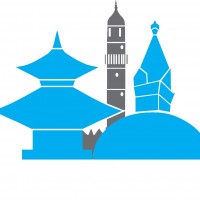

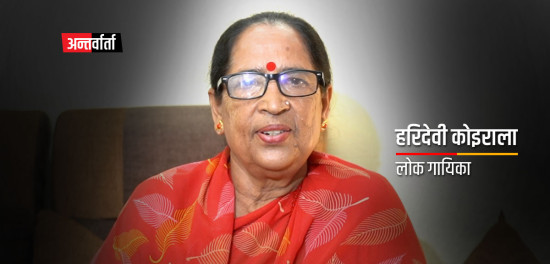
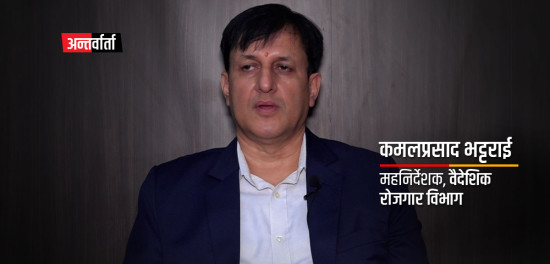
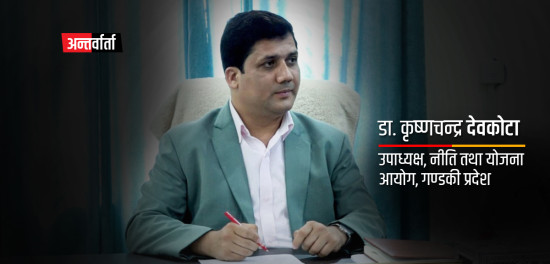
!['नेपाल बारलाई आधुनिक बनाउने हाम्रो लक्ष्य छ' [अन्तर्वार्ता]](https://kathmandupress.com/uploads/posts/550X700/Int-1743512952.jpg)